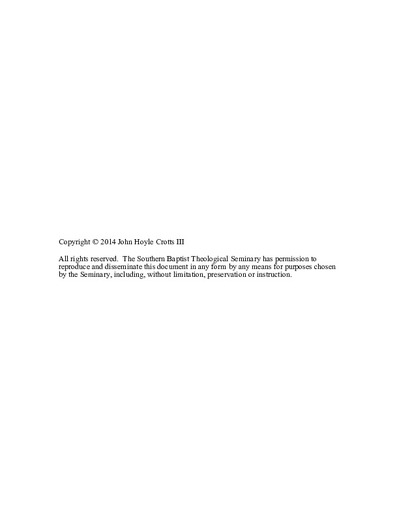Cultivating Graciousness in the Hearts of Truth-Zealots
Abstract
ABSTRACT
CULTIVATING GRACIOUSNESS IN THE HEARTS
OF TRUTH-ZEALOTS
John Hoyle Crotts III, D.Min.
The Southern Baptist Theological Seminary, 2014
Faculty Supervisor: Dr. Donald S. Whitney
This thesis addresses the trend of Christians elevating their zeal for truth at the expense of Christian love. Chapter 1 tracks the revival of theological pursuit at the turn of the twenty-first century. Chapter 2 argues that according to the Bible, instead of diminishing their passion for God's truth, zealous Christians must elevate the corresponding virtue of graciousness. In chapter 3, this thesis demonstrates the importance of graciousness in the lives of Christians by surveying the biblical data to explain the meanings of the term graciousness and its parallels.
The virtue is further illustrated in chapter 4 through an examination of gracious examples in the Bible. The positive examples are the Lord Jesus Christ and the Apostle Paul, while the church at Ephesus exemplifies the danger of a church that loved the truth but was also directly challenged by the Lord Jesus for its lack of love (Rev 2:4).
With the importance of the virtue demonstrated, the thesis provides numerous practical ways for Christians to cultivate graciousness individually in chapters 5 and 6, and then corporately in chapter 7. Chapter 8 concludes the thesis utilizing John Newton's eighteenth-century letter calling for graciousness in theological controversy.

